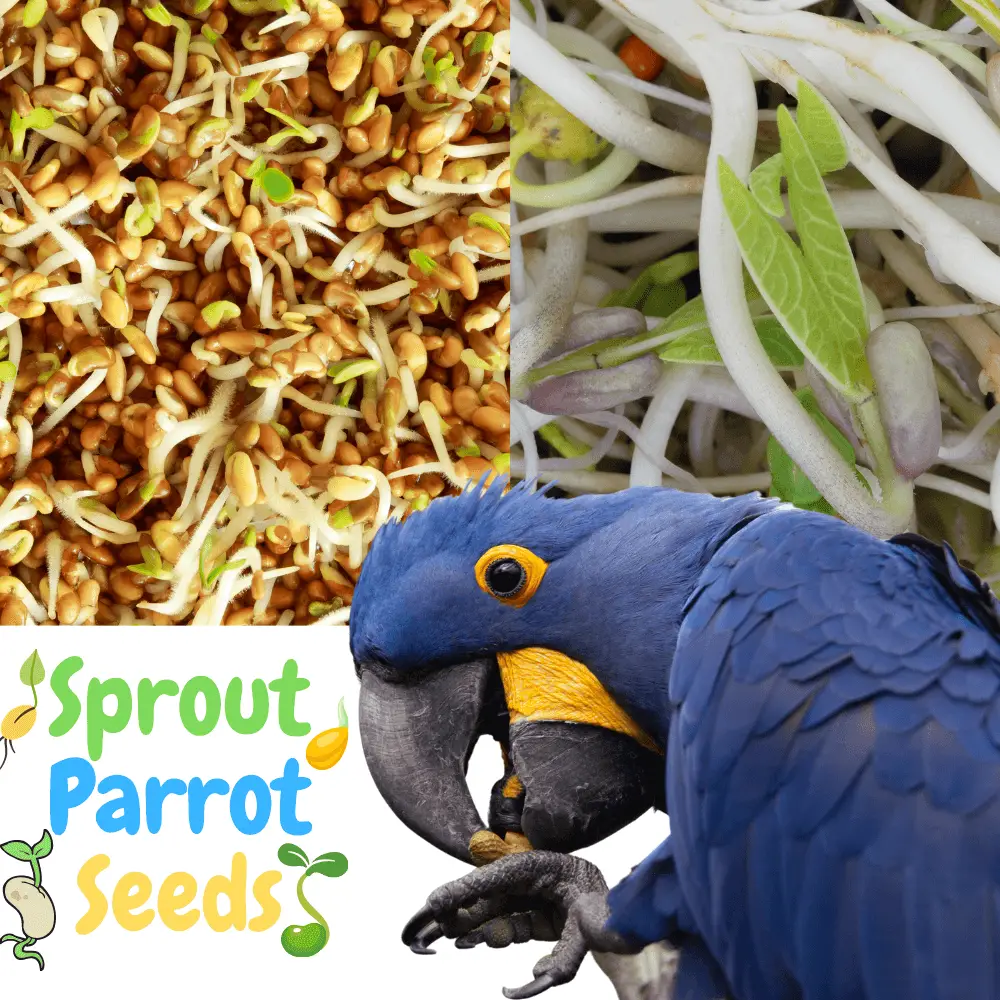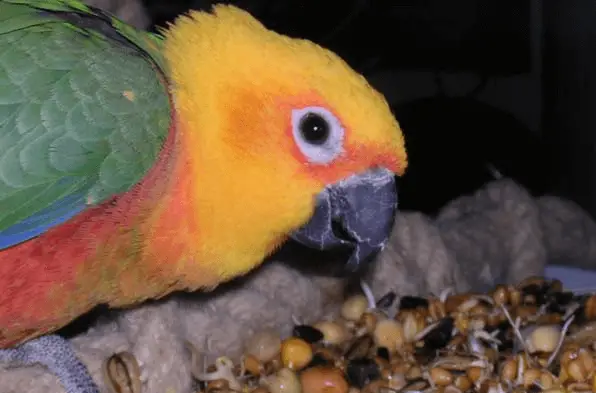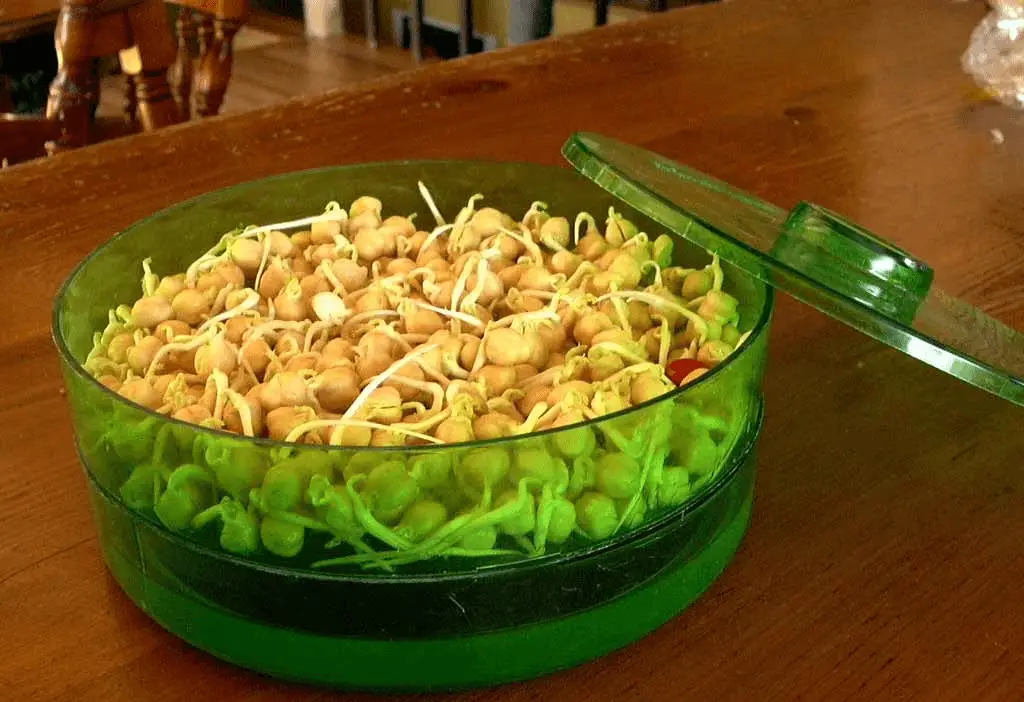
How To Sprout Parrot Seeds: The feeding of our pet parrots needs to be approached carefully. As for us, its importance is of the first order because it influences other areas such as health, well-being, natural needs and behaviors, life expectancy, disease prevention, and dynamism…
Let your food be your only medicine
What are sprouted seeds?
Some parrot owners incorporate sprouted seeds into the diet of their birds. To get them, you have to let Mother Nature work a little (a few tens of hours will be enough)! Under the effect of water and a correct temperature, a dry seed develops and thus produces a germ. It is at this stage that we talk about sprouted seeds.
Why consume sprouted seeds?
This is a simple method to enhance healthy parrot food on the ration. Compared to dry seeds or extruded, sprouted seeds are richer in nutrients including vitamins, calcium, potassium, magnesium, and trace elements (especially iron, selenium, and zinc).
Vitamin content (mg/kg) before and after 5 days of germination – wheat
Since I give germinated seeds to my parrots I find that:
- Everyone loves it! It is an appetizing food and is appreciated by all, small or large species.
- It is very appreciated by young people in the process of weaning since the seeds are easily shelled.
- Gives a fuller, brighter, and brighter plumage.
- Greatly facilitates the regrowth of feathers during molting or in cases of pecking.
Include sprouted seeds in the diet
You can easily include the daily ration of sprouted seeds of your parrots.
Those who choose to distribute punctually, favor the periods of reproduction and molting (expensive in energy for our birds).
3 ways to bring sprouted seeds to your parrot
It is important to choose seeds adapted to the birds you have: small parakeets or large macaws do not eat quite the same seeds!
Sprout Parrot Seeds

To do this, you can:
- Germinate the seeds of your traditional mixture (remember to remove dried fruits, croquettes, and other amenities
- Buy a seed mix or ready-made sprouted seeds (you will easily find them in organic stores)
- Make your own mix
Which seeds to choose?
You can germinate any seed, so to speak. The mixture can be single (a single element) or varied (you combine different seeds).
For budgies
Most often a base of yellow millet (between 30 and 40%), wheat (15 to 20%), oats (15% minimum), white millet (10%), cardy (5%), paddy rice (5 to 10%), canary seed (5%), buckwheat (5%) is used.
For parrots and large macaws
Most often the mixtures are made from cardy (20%), paddy rice (10 to 15%), buckwheat (5%), wheat (10 to 15%), corn (20%), peas (green, white, and marbled mixture) (20%), vetch (2%), dari (2%), hemp (2%).
Sprout Parrot Seeds recipe
I use a universal mixture (adapted to all our species so from the parakeet to the large macaw). The mixture is described in dose/element. All you have to do is take a pod more or less large to vary the overall amount of the mixture!
- 3 / maize
- 3 / sunflower
- 3 / pigeon mixture
- 1/paddy rice
- 1 cardy
- 1 oat
- 1/2 wheat

Other seeds that are simple to germinate alone or in a mixture
Alfalfa, queen of vitamins
It is one of the easiest seeds to germinate and one of the most complete from a nutritional point of view. Rich in proteins, mineral salts, (calcium, iron, magnesium, potassium, phosphorus), and especially vitamins A, B1, B2, B9, B12, C, D, and E.
The lens, a basic
These are the simplest seeds to start with. Lentils contain essential amino acids. Another major advantage: is its minerals. It is also rich in potassium, iron (the brown lentil is the richest), magnesium, and even phosphorus.
Broccoli, a natural antioxidant
Rich in antioxidants, broccoli is a health asset. By slipping sprouted broccoli seeds into the diet, we ensure a good supply of vitamins and minerals.
Buckwheat, rich in every way
Buckwheat contains proteins, amino acids (8), and minerals. It is very rich in fiber which makes it very nourishing and satiating.
The carrot, in all its forms
The sprouted carrot has a very bitter taste. It is interesting to mix it with more neutral varieties such as alfalfa. It is rich in mineral salts and vitamins B, C, D, and E and of course in carotene (provitamin A).
Quinoa, king of South America
Delicious seed is rich in protein, phosphorus, calcium, iron, and vitamins B and E. You can germinate quinoa bought for cooking, it germinates very well.
Radish, detoxifier par excellence
It detoxifies the liver and drains the kidneys, radish is suitable against the obstruction of the respiratory tract and congestive states. The peppery taste of the germinated seed makes it an aromatic of choice. All varieties of radishes can germinate, with Round End Radish and Daikon being the best germinating. Be careful, as it ferments quite easily, it is good to rinse it more frequently (3 x per day) and as it also dehydrates more easily to moisten it sufficiently.
L’Azuki, une richesse venue d’Asie
This small bean of Asian origin has been cultivated for centuries. The Azuki has a pretty red color and offers a short white germ. It germinates very well with seeds from the harvest of the year. Renowned for its richness in protein, vitamins B1, and B2, iron, calcium, and potassium.
Rice, a classic revisited
To use sprouted seed rice, you need to use unhusked seeds (paddy rice for example). You will have to be generous with the humidity to succeed in your germination (rice still grows in rice fields!). After harvesting, you can cook it, at a maximum of 40 ° to soften it while keeping its energy values. Rich in assimilable starch, it contains mineral elements (copper, magnesium, phosphorus, sulfur, etc …) as well as vitamins B1, B2, B3, B6, and C.
Oats, good for muscles
Very rich in fatty substances, carbohydrates, and mineral salts (sodium, iron, calcium, magnesium phosphorus), it is very useful in case of a lack of muscular, nervous, or psychic tone. Typical food of northern regions and cold seasons.
Mung bean, colorful legume
Mung beans are rich in amino acids (since it has all 10 on their own) as well as a high fiber content.
How to germinate your seeds in 5 steps?
Step 1: Preparation
For good success, choose quality seeds (organic if possible).
Rinse your seeds with clean water.
Step 2: The bath
Then soak the mixture for 12 hours (from the evening to the next morning), in clean water.
Count 1 volume of seeds for 4 volumes of water, the seeds should soak in a suitable volume of water. I advise you to put your seeds to soak in the refrigerator, you reduce the development of unwanted bacteria.
Step 3: The sieve
After these 12 hours of soaking (do not leave more), rinse the seeds thoroughly with clean water in a colander or sieve. At this point, you get soaked seeds.
Once rinsed, place them in the germinator. You can also leave the seeds as they are in the colander. In any case, remember to have a container underneath to collect the water.
Finding your germinator
Germination is easily found on the internet or in stores. You can also make a homemade germinator. With a jar or sieve.
Step 4: Mother Nature’s work
In 24 – 48 hours your seeds will germinate. The duration varies depending on the seeds used, humidity, and heat …. Remember to rinse your mixture at least twice a day so that it retains its moisture.
If you want to distribute seeds with a lot of sprouts, opt for germination at room temperature. On the other hand, if you want to achieve moderate germination, prefer germination in a cool place (refrigerator).
Once the germ comes out, you can give it to your birds. Even in the state of “white dot” this germ has all its value, no need to wait until it has grown too much (so you limit the development of bad bacteria). In addition, a seed shoot that is too large can damage or puncture your bird’s intestines (especially valid for large seeds or nuts).
Step 5: To the bowl!
You can serve your sprouted seeds alone or as an accompaniment to the rest of the ration of fruits and vegetables or others (extruded, nuts …). If you wish, before distributing your sprouted seeds, you can add to your mixture:
The doses are resumed on the same principle as before
- 1/2 exotic blend
- 1/2 millet
- 1/2 canary mixture
- 1/2 oyster shell
This brings a “crunchy” side to the mixture and satisfies the little parrots who love small seeds!
Pourquoi mes graines n’ont pas germées ?
- Trempage trop long (supérieur à 24h).
- Seeds are too dry, so a lack of moisture.
- It is therefore necessary to rinse them more often.
- Too high a temperature leads to mold
- A too-low temperature prevents the seed from developing.
Conservation and Hygiene
Sprouted seeds are quickly perishable products, I advise you to keep your seeds, once germinated, a maximum of 48 hours after harvest, and of course in the refrigerator.
Remember to distribute to your bird’s modest quantities, because this mixture must be consumed quickly. The surplus will have to be discarded.
Tip:
To limit the spread of bacteria, fungi, parasites, or other unwanted ones, you can use a few drops of grapefruit extract, a powerful natural germicide. This trick is especially wise on hot days.
Sprouted seeds are a real asset for the health of your parrot, adopt them! You can also take the opportunity to include them in your own food consumption!
How to Sprout Seeds for Your Parrot!
SOURCE:BirdNerdSophie




















